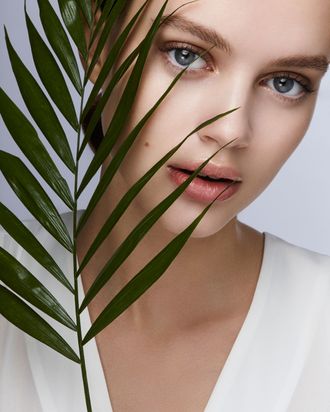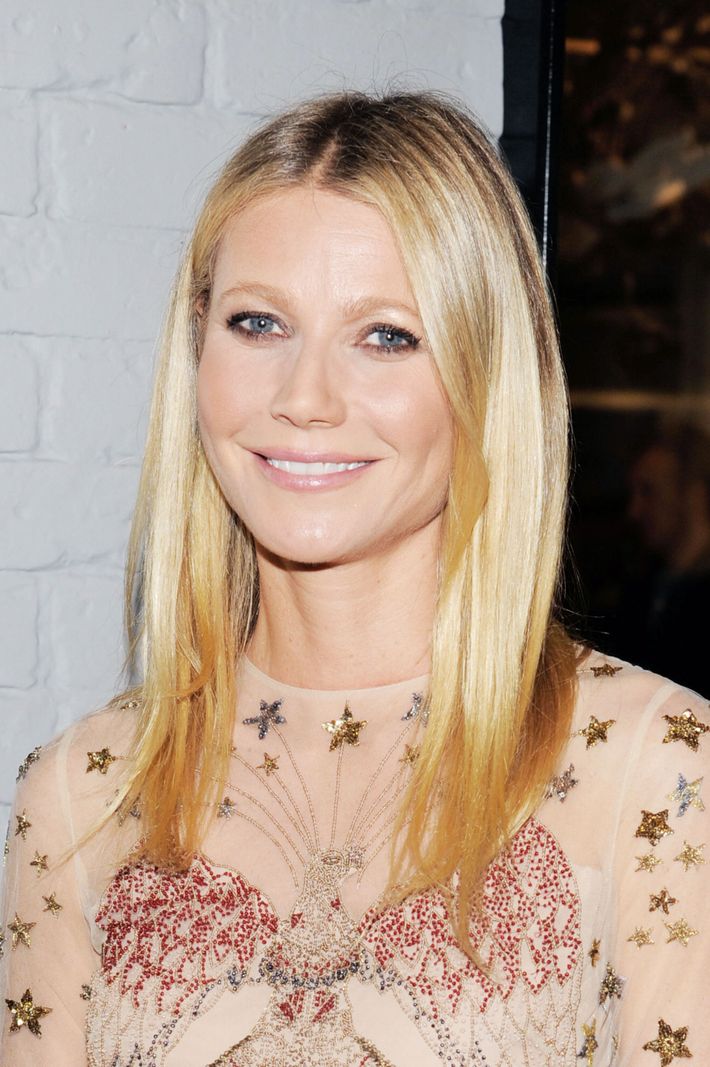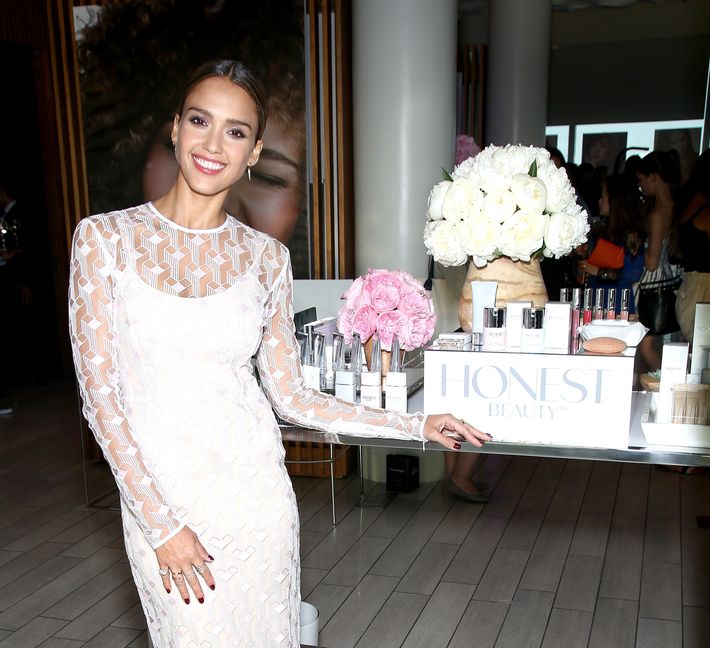
The next beauty revolution is natural — it’s only natural that, given society’s current preoccupation with wellness, that the same health-and-wellness-oriented approach we’ve taken to our workouts, clothes, juice, spices, and even real estate, be extended to our skin care and makeup. We’re buying into it — according to the NPD Group, 55 percent of the gains in the prestige skin-care market in 2016 came from natural brands. Natural beauty is even doing well in the most difficult retail environment — stores, with 85 percent of the gains in brick-and-mortar coming from natural beauty brands. Gwyneth Paltrow and Jessica Alba have created lifestyle empires founded on “natural beauty” products. Luxurious natural beauty stores like Credo, CAP Beauty, and Follain, which display green products beautifully among marble countertops, have all opened in the past two years.
But despite the strength of sales, there’s still a lot of consumer confusion over what natural beauty is and why people care about it. Here’s a primer that explains how natural beauty differs from organic, and the results of talking with several dermatologists and green-beauty experts to answer the questions: Is “natural” beauty something worth trying and is it really “better” for you?
What does natural mean? Well, really nothing — and whatever brands want it to mean. Natural has no “regulatory” meaning, as “natural,” “vegan,” and “green” are not regulated terms. When you see them on packaging, know that any brand can use those terms, even if their product contains straight-up lead (but rest easy — lead is regulated by the FDA, there can’t be more than 10 parts per million in your beauty products). The word organic is somewhat regulated — not by the FDA, but by the USDA, which uses it to confirm that ingredients in beauty products are free of synthetic pesticides, fertilizers, and other nonorganic substances.
Broken down even further, there are levels of organic. 100 percent organic means what it says. A general designation of “organic” means it contains at least 95 percent organic ingredients. “Made with” organic ingredients means that it has at least 70 percent. If it has less than 70 percent, a brand isn’t allowed to use the organic designation.
But why should we care about natural or green beauty products, when we have lots of nonnatural or green ones? This is where it gets complicated. Let’s break it down.
Does “natural” mean that it’s free of parabens? As mentioned above, natural is not regulated. So no, not necessarily. Dr. Macrene Alexiades says, “Just because it’s organic or natural doesn’t mean it’s free of parabens.” (Here’s why people are concerned about parabens. The FDA believes that at this time they do not have information “showing that parabens as they are used in cosmetics have an effect on human health.”)
Does “natural” mean that it’s free of toxins? No. (Here’s why people are concerned about toxins, even if they don’t have a specific definition.)
Does “natural” mean that it’s free of sulfates or fragrance? No. (Some people, like the Cosmetics Cop Paula Begoun, consider fragrance to be a known skin irritant. Sulfates are an inexpensive detergent often found in beauty products and identified on ingredient labels as sodium lauryl sulfate or sodium laureth sulfate. They’re also seen by some as a skin irritant.)
Does “natural” mean it is free of phthalates? No. (Here’s why people are concerned about those.)

So does natural mean that it’s better for you? Let’s get specific.
Does natural mean it won’t hurt you? No. Dermatologists warn that it’s important not to conflate natural with “good for you.” Dr. Amy Perlmutter of the New York Dermatology Group says, “Natural doesn’t necessarily mean safe.” The example they often like to give is that arsenic is “natural,” but deadly.
According to some product formulators, some “natural” ingredients can be more irritating for the skin. CEO and co-founder of the natural-meets-clinical line Drunk Elephant created her line partially with this impetus, making her line free of essential oils, after finding that they were irritating to her skin and her customers’. She explains, “We need to dispel the myth that all-natural means good. All-natural can be very irritating.”
Are there “bad things” seeping into my skin with nonnatural beauty products? In natural beauty presentations, I’ve heard the statistic that “60 percent of what you put on your body is absorbed into the skin” with the same regularity that the word “Russia” has been spoken since Trump got elected. The statistic is meant to indicate that you don’t want nonnatural skin care and its “chemicals” to be absorbed into your skin. But the several dermatologists I’ve spoken to question the validity of this reasoning.
When I mention the statistic to Dr. Macrene Alexiades, she says, “Look, I was up till 1 a.m. researching this. You cannot make a general statement like this. You need hard data.” Dr. Perlmutter adds, “There are many factors that influence absorption, such as structure/size of the substance applied, concentration of the chemicals applied, skin integrity, skin temperature, duration of the exposure and location,” while concluding that the percentage can’t be quantified so easily.
Dermatologists clarify that your skin is not a infinitely porous surface through which anything gets absorbed. Imagine if your skin was completely able to absorb anything you put on it — that would mean that when you took a shower, your skin would swell with water till you looked like Violet Beauregarde from Willy Wonka. It would also mean that anytime you put $350 La Mer onto your skin, everything in that fancy jar would instantly penetrate into your skin. I’m sorry to tell you that it doesn’t — a limited percentage of what you put on your skin actually gets absorbed deep into the skin, which is why it’s so hard to make beauty products that actually work. If your skin was that permeable, beauty scientists at companies like Estée Lauder and L’Oréal would be able to save thousands of dollars by not having to discover what they call “skin-care delivery systems” — basically, science that permits the fancy peptides and ingredients they formulate in their skin care to penetrate the skin barrier. Practices like exfoliation and dermaplaning are thought to have benefits because they slough off dead skin cells to allow for better beauty-product penetration.
The truth is that if you have healthy skin, you have what dermatologists call a healthy skin barrier. If the molecules in your skin-care products are too big, zero percent of it gets absorbed into your skin. Water is too big of a molecule, as is straight-up fat. Various types of vitamin C are even too large. As Dr. Lancer says, “Very, very small molecules in very small quantities get absorbed into the skin at a slow rate.” If you have an impaired skin barrier, “natural” or not, everything will detrimentally impact you. “If you had bad eczema or an impaired skin barrier and put tea-tree oil on it — something that’s considered nontoxic, you’ll be writing in pain,” Dr. Lancer explains. The bottom line is that you don’t know exactly what percentage of what you put on your skin is getting absorbed into it.
Wait, but should I be concerned that some things are being absorbed into the skin? This is where natural-beauty advocates and dermatologists differ in their stances, making it difficult to draw a definitive conclusion. Many natural-beauty advocates believe there are some “bad things” are being absorbed into the skin via parabens, phthalates, and sulfates, despite the FDA’s current stance. RMS Beauty founder Rose-Marie Swift says, “Many think the skin doesn’t absorb anything. But nanoparticles and other gender-bender chemicals are able to penetrate into the body. With the skin being your biggest organ, why not choose things that are safer and healthier for you?”
Dermatologists want hard data and believe there hasn’t been enough conclusive research to prove that there are harmful chemicals being absorbed into the skin in harmful quantities. Dr. Dennis Gross says, “Science requires clinical research for it to have any religion. Absorption rate has never been shown. My gold standard to any statement is to show me the data. Look, natural-beauty advocates are just as guilty as making outlandish claims as any other groups. I don’t want to instill panic in people and tell them to be extremists, but we have to be reasonable.” Dr. Gross also believes that ingestibles are a bigger concern. “When you eat something, that definitely gets into your bloodstream versus something you put on your body, which is absorbed in trace amounts.”
But are there certain ingredients that are questionable and used in American beauty products? What about those EWG reports? The Environmental Working Group is a watchdog organization that releases reports about the toxicity of ingredients in beauty products, with Skin Deep, a searchable database of “toxicity” in beauty products. It can be a useful resource but its standards for toxicity are far harsher than those of the FDA. For example, the FDA permits lipstick with levels of lead less than ten parts per million. The EWG believes that no lead should be allowed in your lipstick, not even in trace amounts. Many beauty founders who are ingredients-oriented, including Tiffany Masterson of Drunk Elephant and Vicky Tsai, co-founder of Tatcha, consult the database when formulating products. Tsai calls the EWG “the nation’s leading environmental-health research and advocacy organization.”
But dermatologists are also wary of scaremongering, believing that the EWG’s conclusions aren’t definitively conclusive at all. Dr. Perlmutter says, “A normal consumer should think critically and be careful. These reports are often based on very thin evidence and they can jump to quick conclusions.” Dr. Dennis Gross’s advice to patients that come to him with EWG concerns is: “If there is no data to prove what these advocacy groups and the EWG says, and you wonder where the FDA comes up with this random number, then you have to abstain from the product in question.”
Even natural-beauty advocates also suggest you take the EWG reports slowly. Shirley Pinkson of the natural-beauty brand W3ll People says, “Don’t sound the alarms or panic if your favorite foundation rates in the red — take action by making a healthier choice. If you are ready to make the deep dive today, start with the products that you use every day. Look for a hazard rating of three or lower.” If the EWG reports overwhelm you, she also has a simple rule of thumb: “If you can’t pronounce the first five ingredients in a makeup product, it’s probably not ‘good for you’ or natural.”

So why does anyone use natural-beauty products? For that, we asked several dermatologists, brand-founders, and clean-beauty advocates about their best reasoning for using natural-beauty products.
Adina Grigore, founder of S.W. Basics: “Why not? Aren’t we trying everything else? If you’re buying beauty in general, there is literally not one legitimate reason to not also try the natural options. There is a mistaken assumption that because something is natural it will automatically work for your skin (and better than anything else ever has before), which is to the detriment of consumers and to the natural-beauty industry as a whole. Yes, coconut oil might make you break out. Yes, lavender might give you a rash. That doesn’t mean every single other natural ingredient won’t work for you. If you buy Neutrogena face wash and don’t like it, that doesn’t mean you decide to swear off face wash forever. So while ‘natural’ might take a little bit of experimenting and exploring, I don’t believe it’s any different from any other product or category when it comes to whether or not you should try it.
The benefits (once you let yourself explore) are worth it, which is why it’s a trend in the first place — it’s working for lots and lots of people. So once you find a natural product that works for you, you are giving your skin, body, and endocrine system a much-needed break. We are overburdened by stress, pollution, and dangerous synthetics. Natural beauty is one of the ways you can lighten that burden.”
Dr. Dennis Gross: “No parabens, sulfates, and phthalates — that’s what I recommend to my wife and kids. The FDA does evaluate scientific evidence. But if you have other choices, then why take a chance. It’s that simple. I feed my kids hormone-free milk. There’s no clear-cut science that hormones in milk are something that causes harm in people, but why take that chance?”
Kerrilynn Pamer, co-founder of the natural-beauty store, CAP Beauty: “Psychologically, it makes sense of people oriented with wellness and health to think about using ingredients that are really beneficial for the skin, [don’t] contain synthetics, and which are very, very good for you. Don’t just try natural products because they are good for you. We believe these products have the potential to work really well. Think about it like canned peach versus fresh peach. Most people want the fresh peach. The products we carry have shorter shelf life. They don’t need preservatives. I truly believe that like eating a raw vegetable versus an old, cooked vegetable, natural beauty feels and tastes different.”
Dr. Amy Perlmutter: “It’s okay to try it, but be careful and aware that scientific evidence is lacking.”
Dr. Lancer: “I use scientists, whose jobs are to find out the most effective, safest products to use. With natural or homeopathic remedies, it’s total quicksand of what will or won’t work. And usually, it doesn’t work. But if a consumer were to come in all concerned about their natural skin-care routine I would say, ‘If it works well for you, then keep using it.’ Personally, I don’t see toxicity as a big issue. I have trouble remembering the last time someone came into my office with an allergy problem from a comparable product retailed in the U.S. But it’s a complicated story. It’s torn between pleasing the naturalists of the world and saying, ‘Look, the body is an immune system. It’s prone to adaptation and to handling some insults.’”
Jessica Alba: “You don’t know what certain ingredients can do and how it can affect your health over time. In this country, we use a ton of ingredients that they ban in Europe. We don’t have the same regulatory process. I think it’s better to not use them. You don’t know how they’ll affect you over time. If you can get the same benefit from different ingredients, then why not?”
Vicky Tsai, founder of Tatcha: “There are some synthetic ingredients which cause no harm to the skin, just as there are some natural ingredients which are harmful (think of a bee sting). When we create a formula, the active ingredients are natural, but we wanted to be able to properly preserve and protect it. Once complete, we test every item in our collection to ensure it is nonirritating and non-sensitizing.”
Catherine Moellering, head of beauty for Anthropologie: “We’ve found in beauty that our customer is looking for more transparency in the ingredients she is using. Many of our customers are just starting to incorporate some of the great organic and natural beauty lines out there into their routine and so it isn’t about completely shifting to an all-natural skin-care and makeup regimen, but about making small changes and experimenting to see what works best for them.”
Tiffany Masterson, founder and CEO of Drunk Elephant: “There are natural ingredients which are very beneficial, nurturing, and valuable. But naturals have the good and the bad. But there are also great synthetic ingredients like ascorbic acid, glycolic [acid], and vitamin C, which when combined with natural antioxidants, can be more potent and valuable in a formula.
Rose-Marie Swift, founder of RMS Beauty: “There is yin and yang in the world. There are people that voted for Trump and those that voted for Hillary. There are people don’t use any chemicals and then there are those who don’t mind injecting it into their face. Some people believe in man-made climate change and others think it is nonsense. No one comes to an agreement on it all. When it comes to natural beauty, I’m more of a purist. We need to stop looking at our bodies as a computer. Our systems are a living, breathing, natural entity. Everything we need is here on earth in Mother Nature to heal ourselves. “
Gwyneth Paltrow: “Ten or 15 years ago with organic food, people didn’t understand it, and now we have this mass movement. [Today] people are really understanding now how absorbent an organ the skin is … how applying toxic chemicals on our skin is not good for us.”





